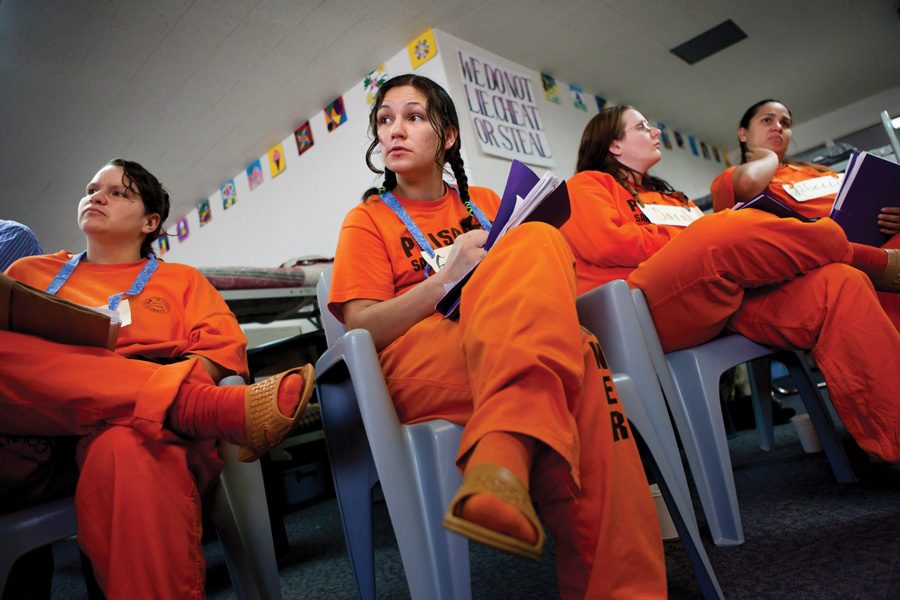Female prisoners disciplined more harshly than male prisoners, Medill investigation finds
Source: Dai Sugano/San Jose Mercury News/MCT
Prisoners in a workshop. An investigation by Medill found that woman can be Women in U.S. prisons can be disciplined for low-level offenses up to five times more frequently than their male counterparts.
October 26, 2018
Women in U.S. prisons can be disciplined for low-level offenses up to five times more frequently than their male counterparts, according to a Medill School of Journalism, Media, Integrated Marketing Communications investigation.
The investigation, in collaboration with National Public Radio earlier this month, was conducted by Medill’s Social Justice News Nexus, a cohort that pairs graduate students with professional journalists in the Chicago area.
A 2016 report from the Women’s Justice Institute attracted Medill Prof. Kari Lydersen’s attention for its coverage of how the women at Logan Correctional Center — the largest all-female prison in Illinois — received up to five times the amount of write-ups than male prisoners for low-level infractions.
Lydersen said she was interested in exploring this discrepancy further, and contacted freelance reporter and former NPR journalist Jessica Pupovac to collaborate. Their objective was to see if the discrepancy between infractions against male and female inmates existed outside of Logan Correctional Center.
“Initially we were really seeing this as an Illinois story,” Pupovac said. “We were going to look at what this disparity meant, and then also how the state was working and not working to address it.”
But data showed that the tendency to give out a large amount of low-level infractions to female prisoners was nationally consistent. Pupovac reached out to former colleagues of hers from NPR, and partnered with them to expand the investigation.
A large portion of the reporting was done by three Medill graduate students, who worked to collect data from prisons all over the country.
Sydney Boles (Medill ‘18), a student who earned her master’s degree last spring, said she and her peers worked with each state’s Department of Corrections to retrieve as much information as possible about how women are disciplined in prisons.
Boles said across the board, the investigation found that women would be seriously punished for very minor incidents. She was particularly disturbed by a policy in Indiana where five low-level infractions would be counted as one high-level infraction — a woman who received multiple infractions for something such as rolling her eyes would be treated as if she had assaulted someone.
“Women could really seriously get punished in ways that would have lasting implications for their record, their ability to see their kids and even for their well-being,” Boyles said.
Pupovac said there were multiple probable reasons for the increased rates of infractions against females, but that several inmates thought it was a way for officers to maintain and demonstrate their power over the female prisoners.
And that has an effect on inmates’ mental health.
Pupovac said the majority of women in prison have experienced extreme trauma: in Illinois, 97 percent of incarcerated women are victims of trauma; studies estimate 70 to 80 percent nationally.
The way prisons are run often end up exacerbating trauma, Pupovac said. Training officers to understand how to be aware of trauma could be a positive influence on inmates, but the way officers treat incarcerated women shows a lack of such awareness.
“When they go into prison, it could be an opportunity for us as a society to finally give them the services that they have shown that they need, but instead they’re often belittled and demeaned and abused,” Pupovac said.
Lydersen said although the investigation was difficult and often upsetting, she and the rest of the team were extremely proud of the end product. One of her hopes is that the story spreads awareness of the issue and attracts the attention of the Department of Corrections.
“Hopefully our story will add to the momentum that some of the reformers have been building, to get the Department of Corrections to take this more seriously,” Lydersen said.
Email: [email protected]
Twitter: @wilsonchapman10


